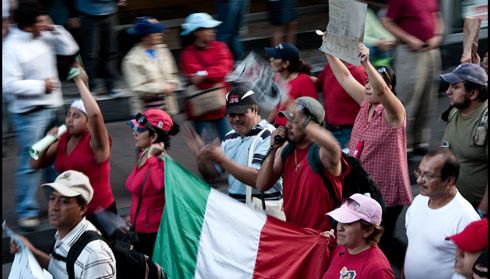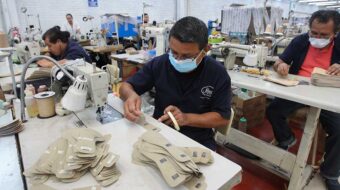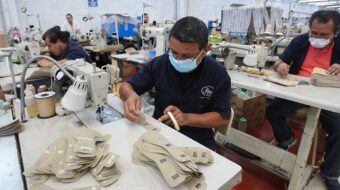
September 16, 2010 is the 200th anniversary of Mexico’s declaration of independence. But so far, any inclination to celebrate is being overshadowed by vast economic and social problems.
Mexico’s economy is in terrible shape. The gross domestic product declined by 7.1 percent in 2009, one of the sharpest drops in the world. Hundreds of thousands of jobs were lost in the wake of the world financial crisis. Toward the end of the year, the government of President Felipe Calderon, of the right-wing National Action (PAN) Party, added to this, firing 44,000 unionized electrical workers by abolishing their state-owned company, evidently in order to break their fighting union, the SME (Mexican Electricians’ Union).
The stated unemployment figure of 5.3% at the end of 2009 (Mexican National Institute of Statistics) is beyond deceptive. The safety net for the unemployed in Mexico is minimal, so people who lose their jobs mostly move into the unofficial economy of selling things on the street, selling cooked food out of their homes, or working off the books for sub minimum wages. Others are absorbed into illegal activities, or head for the U.S. Mexican borders, without papers, because legal U.S. visas are not to be had.
All of this is happening in the context of a bloody war among the government and various violent drug-trafficking gangs. Calderon has mobilized 50,000 troops to fight the gangs, as in many areas police have been bought off or are outgunned. But the Mexican military is far from having clean hands in such matters, and human rights organizations denounce a sharp increase in violent repression of innocent citizens by the military.
Then at the end of 2009 and the first days of 2010, the people of Mexico suffered two new blows. First, the government rammed through significant regressive hikes in income, sales and value-added taxes, to deal with a mammoth budget deficit created by the current financial crisis (for example, the income tax went up from 28 percent to 30 percent). A number of new taxes were also included, including one on bank deposits over about $1,000. Shortly thereafter, increases in the price of gasoline and diesel fuel were announced, which led in turn to a general increase in prices generated by increased transportation costs. This threaten the country with famine, according to numerous social activists.
Although Mexico is one of the world’s biggest producers of oil, production has been declining and nearly half of its gasoline and diesel fuel is imported, because of lack of local refining capacity. The national oil company, PEMEX, has been harmed by the failure of the government to invest in modernization and upkeep of facilities: Lately, there are press reports that vast amounts of oil are being siphoned off from pipelines and sold illegally at cut-rate prices in the U.S. Click here for further information.
The opposition in the Mexican Congress, consisting of the Revolutionary Democratic Party (PRD), the Labor Party (PT) and the Convergence Party, has been joined by the PRI caucus to object to the rise in fuel prices. They compelled the Treasury Minister Ernesto Cordero, and Augustin Carstens, governor of the Bank of Mexico, to appear before a hearing to explain the policies. But Cordero denounced a proposal by the PRD to freeze oil prices until a Congressional investigation could be undertaken as “populism”, a dirty word in the vocabulary PANistas. Carstens pooh poohed the idea that the rise in taxes and fuel prices would spark an inflationary dynamic.
The Mexican people are hitting the streets in large numbers to demand an end to these assaults. Truck drivers, farmers and workers have been organizing shutdowns and other actions in various parts of the country. The SME workers continue to protest and to link their struggle to the overall situation of the Mexican working class and masses.
Unfortunately, the next presidential election is not until 2012. In June of 2009, elections to the lower house of Congress, the Chamber of Deputies, showed a considerable loss for Calderon’s PAN, but only the PRI benefited, because the left went into the election extremely divided and thus also lost seats. Only state and municipal elections are scheduled for 2010.
The old dictator Porfirio Diaz, who was forced out in 1910, ended up surrounded by such a gang of sycophants that when he asked what time it was, the answer would come: “Whatever time you say it is, mi general”. That story may or may note be accurate, but it rings increasingly true for Calderon, who seems lost in a rose-tinted world of his own.
Photo: http://www.flickr.com/photos/rodrigoherraz/ / CC BY-SA 2.0

MOST POPULAR TODAY

Zionist organizations leading campaign to stop ceasefire resolutions in D.C. area


High Court essentially bans demonstrations, freedom of assembly in Deep South

Afghanistan’s socialist years: The promising future killed off by U.S. imperialism

Communist Karol Cariola elected president of Chile’s legislature






Comments